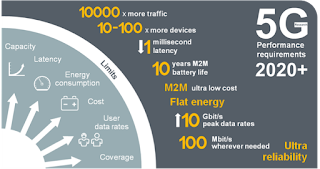5G is the next generation of mobile networking technology following 4G. Much like every generation before it, 5G aims to make mobile communication faster and more reliable as more and more devices go online.
Unlike in the past, when mobile networks only needed to support cell phones that were just for browsing the web and text messaging, we now have all sorts of bandwidth-demanding devices like our HD-streaming smartphones, smartwatches with data plans, always-on security cameras, self-driving and internet-connected cars, and other promising devices like health sensors and untethered AR and VR hardware.
As billions more devices connect to the web, the entire infrastructure needs to accommodate the traffic to not only support faster connections but also better handle simultaneous ones and provide broader coverage for these devices. This is what 5G is all about.
How 5G Benefits You
- Minimal lag when streaming videos and playing games
- Safer cities with smart, interconnected vehicles
- Near-instant access to most files online
- Smaller devices that offload hardware requirements to remote servers
- New products and applications that require ultrafast speeds
- Reliable internet in remote areas
How Is 5G Different From the Other “Gs”?
5G is simply the next numbered generation following 4G, which replaced all the older technologies.
- 1G introduced analog voice
- 2G introduced digital voice
- 3G ushered in mobile data
- 4G paved the way for widespread mobile internet usage
When Will 5G Come Out?
The time frame for 5G service availability depends not only on where you live but also on which service providers are available in your area.
Right now, 5G is available in a relatively small number of locations, so not just anybody can sign up for service. Verizon, AT&T, T-Mobile, and some smaller companies already provide it to customers in the United States in hundreds of cities, but it's primarily targeted to heavily populated areas. There are also carriers that have live 5G networks elsewhere around the world.
5G phones are also an important component of this new fifth-generation cellular network because not just any phone can work with the network. There are already quite a few compatible devices on the market right now and more are coming out all the time.
See When Is 5G Coming to the US? for more information, or 5G Availability Around the World if you're not in the US.
Latest 5G News
Internet service providers, mobile network operators, and other companies are constantly coming out with new 5G trials and other announcements as networks roll out around the world.
- March 9: Samsung and Spark announce the launch of a 5G network in Christchurch, the most populous city in South Island of New Zealand.
- March 9: US equipment vendor and 5G tech company Airspan Networks announces plans to go public through a merger with New Beginnings Acquisition.
5G Supports Lots of Devices
At a minimum, 5G must support 1 million devices for every square kilometer (0.386 square miles). This means that within that amount of space, the network is capable of connecting a whopping 1 million or more devices to the internet at the same time.
This type of scenario might seem hard to fathom considering cities with the highest population density (like Manila Philippines and Mumbai India) "only" hold anywhere from 70,000 to 110,000 people for every square mile.
However, 5G doesn’t need to support a mere one or two devices per person but also everyone’s smartwatch, all the vehicles in the area that might be connected to the internet, smart locks in nearby houses, wearables, and any other current or to-be-released device that needs to be on the network.









0 Comments